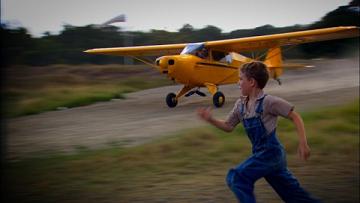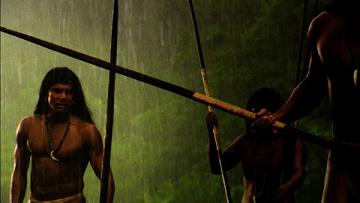

In 1956, five Christian missionaries were slaughtered by the Waodani, an indigenous tribe in Ecuador's Amazonian rainforest. These five missionaries were trying to evangelize to the Waodani, who were highly mistrustful of outsiders and had a reputation for violence. Amazingly, the wives of the missionaries, led by Rachel Saint, returned to Waodani tribe to preach the Gospel. They befriended the tribe and lived with them for decades afterwards. It is an inspiring story of sacrifice, and marks a turning point for Christian movies. Up to the point, most Christian films were fictional stories, oftentimes made just to preach to audiences or present some lesson. The films were too preachy and very amateurish. The filmmakers behind The End of the Spear realized that there were compelling stories within Christian history that could attract non-Christian audiences while playing to the sensibilities of Christians. Religion is an integral part of the characters, it is not something the filmmakers added afterward.
The End of the Spear hopefully marks an improvement in this small but growing genre. The production value is good (the movie was filmed in Panama), and the acting is decent. There are a few special effects of what is outside as characters fly around in helicopters, but this movie relies on the story itself, and not on special effects. The largest drawback is the music, which sometimes overpowers everything else. Director Jim Hanon (who also directed Beyond the Gates of Splendor, a documentary about the same subject that plays over the ending credits) wants to make things more dramatic and emotional and really overdoes the score. Some music is always good, but there's just too much here.
The film, written by Hanon, Bill Ewing, and Bart Gavigan (Luther) is told from the perspective of Steve Saint and Mincayani (Louis Lombardi, Dead Dogs Lie, Shaft). Mincayani killed Saint's father Nate (Chad Allen, Paris, Do You Wanna Know a Secret?) in an unfortunate misunderstanding shortly after the missionaries made contact. This is also not a great choice for the film, since it leaves out much of the overall story, focusing instead on Mincayani and Steve. The Waodani's lives were full of violence, often killing other nearby tribes in retaliation for past violence, a vicious circle with no end. They frown upon weakness, and an extended introduction with Mincayani as a child quickly sets up the Waodani culture for the viewer.
Hanon flashes forward to 1956, where the Waodani's kill the missionaries. A young Steve (Chase Ellison, Mysterious Skin, Scenes of the Crime) accompanies the wives as they make their way back to the jungle. They live with the Waodani, provide medicine, and try to slowly convert them. Steve leaves, but not before the presence of the missionaries changed the Waodani men. There is an extended coda with an adult Steve (also played by Allen) returning for a funeral. By focusing on Steve, half of the story is missing. Saint (Sara Kathryn Bakker) or Elisabeth Elliott (Beth Bailey) would have been better subjects. By focusing on Steve and Mincayani, half the story is still missing.